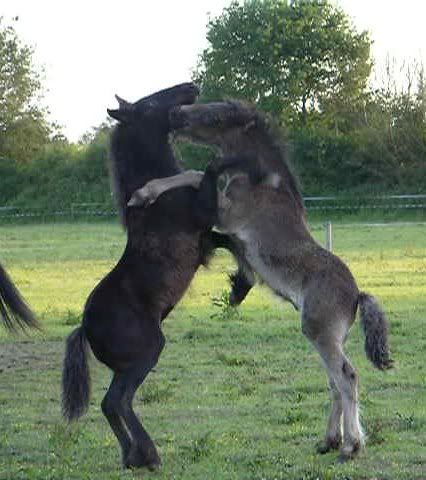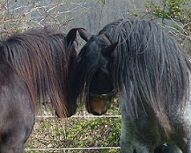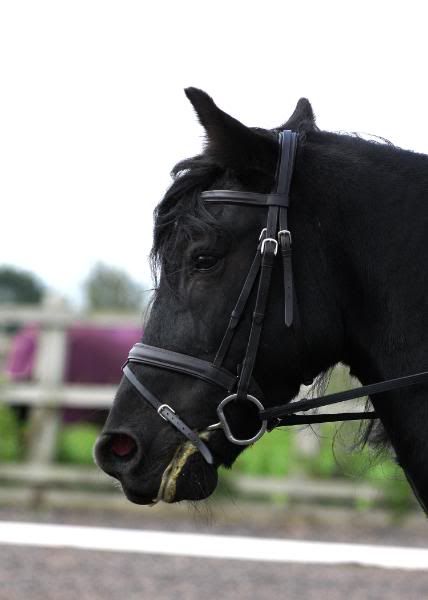Post by taffydales on Jul 18, 2010 8:38:06 GMT -1
This has been recommended by a good friend of mine who has found a marked improvement on her mare who has suffered with the condition for years, we have had Digs on it for the last few weeks and I,m really impressed.
Oat Diet
Having been asked by many people for a sensible way to feed their horses and having since been asked so many times for a copy of my oat diet I have decided to put it up for all to see, I stress that this is purely advice and not written in stone to be obeyed!!!
This is a diet I recommend for all horses but especially for horses that are not ‘doing well’ or ‘tying up’ or having ‘problems’ in the kidney area, showing dietary problems like spots or ‘sweet itch’ or just simply being ‘hyper’. It suits all horses and is much more cost effective as well as healthier.
Oats are classed as both a herb and a food, they are a strength-giving cereal, low in starch but high in minerals. Also rich in Vit. B they contain alkaloids, glycosides and fixed oils which are an important source of Vit. E. They are a nerve tonic and bone building and contrary to modern day thinking are the best possible feed for horses that are in work. The best way to feed them is soaked as explained here.
Soaked whole oats, soaked for approx. 12 hours in cold water, this makes the oats a living enzyme again, which enables the horse to digest them more easily. Because they are now a living enzyme and easier digested the energy is released into the system quicker and without any build up of lactic acid, so no tying up, and also they do not affect the temperament due to no starch build up in the hind gut. The other benefits of soaking include the fact that any chemical residue from sprays etc., are washed away, but not the goodness of the oat, also as Vit E is in the outer husk of the oat, after soaking it becomes easier to assimilate. The oats should be drained if possible overnight or for at least an hour before feeding, and enough can be put up to last a whole day. If they are put up for example first thing in the morning and then drained at evening stables they will be ready to feed next day. All you need is a hessian sack and a spare dustbin.
In light work I would suggest approx. 2lbs - 3lbs of oats twice a day with alfalfa (weigh soaked oats not dry) and of course good hay. The amount can then be increased gradually if and when the work increases. A horse in hard work, ie. eventing or racing should be able to eat 12 - 14lbs of soaked oats a day. The best supplement to feed is seaweed, one 15ml measure once a day, it is high in minerals and trace elements. It is rich in copper, iron, iodine, magnesium, phosphorous, silicon and sulphur. The iodine content, which is a supreme gland builder and conditioner, reduces excess fatty tissue and removes toxic elements, along with iron which is of premier importance to the blood, promoting oxygen absorption and building red corpuscles. Carrots are excellent for the liver and digestive system and full of calcium. Alfalfa is classed as a herb because it is very deep rooting, it is a rich source of calcium and also contains chlorine, magnesium, phosphorous, potassium, sodium and sulphur, it is also rich in vitamins. It is high in protein, but this is a natural source of protein, it is also a diuretic, and more importantly has 8 digestive enzymes in it which stimulate the digestive system, enabling the proper assimilation of the nutrients provided. It is a very good ‘balancer’ to be fed with oats, although it is a complete feed in its own right. Try and find an Alfalfa chaff that does not contain any molasses, when a chaff contains molasses there has to be a mould inhibitor, i.e. propionic acid, unfortunately propionic acid can cause stomach ulcers, so try and find a chaff with No additives. If you are looking to feed a diet based on roughage, I suggest you look at Fibre feeds, they have complete range of feeds with no added molasses or propionic acid, they are on the links page.
A bran mash once or twice a week with a small handful of Epsom salts, to keep their system clean, this has become unfashionable due to modern day nutritionists, however it is as good for horses nowadays as it was in the past.
Other feeds that can be added, sugar beat, preferably un-molassed helps keep condition on, it is also good for keeping the bowels working, and is very good for lactating mares. it is also high in calcium.
Cider Vinegar internally, is good for them an egg cupful daily, this is also excellent used externally for any sore or inflamed joints. Corn oil is also a good additive, again an egg cupful a day mixed into the feed.
Salt should also be available, and the best source is Rock Salt, not the man made licks but the rock salt that is pure and dug out of the ground and many feed merchants do sell it. It comes in large chunks, which can be broken down to put in the stable or one large chunk in the field for horses grazing.
For those horses that need to put on weight or hold condition boiled barley, boiled linseed and flaked maize are all good ‘fattening’ foods. Boiled barley can be given once a day in the evening feed, ¼ of a scoop of boiled barley per horse, whereas linseed is better only given 2 -3 times a week as it can overload the liver.
And finally but very important good quality hay, if you have to feed horsehage or haylege for some reason then make sure it is low protein and not too wet and acidic as the acid content can contribute to ulcers, also the fact that if it is very high protein it can’t be fed in large quantities, therefore the stomach has long periods of being empty, and because the horse is a browser, continually grazing, only stopping for short periods to sleep, this causes an acid build up which again causes stomach ulcers, this is why it is helpful to sometimes feed extra chaff or good clean oat straw as non fattening forage bulk.
I realise that this diet is ‘old fashioned’ and that the modern day diets are far easier, however that does not mean they are better and although modern day nutritionists say that the old diets were bad for horses, it was all that horses were fed in the past, and the horses were far fitter, healthier, less colics, ulcers, hardly any sweet itch, fewer cases of tying -up, fewer cases of fractures and bursting, far less cases of laminitis, I think the evidence speaks for itself, and I am confident that you will be delighted with the results, and the reduction in your feed bills.
Oat Diet
Having been asked by many people for a sensible way to feed their horses and having since been asked so many times for a copy of my oat diet I have decided to put it up for all to see, I stress that this is purely advice and not written in stone to be obeyed!!!
This is a diet I recommend for all horses but especially for horses that are not ‘doing well’ or ‘tying up’ or having ‘problems’ in the kidney area, showing dietary problems like spots or ‘sweet itch’ or just simply being ‘hyper’. It suits all horses and is much more cost effective as well as healthier.
Oats are classed as both a herb and a food, they are a strength-giving cereal, low in starch but high in minerals. Also rich in Vit. B they contain alkaloids, glycosides and fixed oils which are an important source of Vit. E. They are a nerve tonic and bone building and contrary to modern day thinking are the best possible feed for horses that are in work. The best way to feed them is soaked as explained here.
Soaked whole oats, soaked for approx. 12 hours in cold water, this makes the oats a living enzyme again, which enables the horse to digest them more easily. Because they are now a living enzyme and easier digested the energy is released into the system quicker and without any build up of lactic acid, so no tying up, and also they do not affect the temperament due to no starch build up in the hind gut. The other benefits of soaking include the fact that any chemical residue from sprays etc., are washed away, but not the goodness of the oat, also as Vit E is in the outer husk of the oat, after soaking it becomes easier to assimilate. The oats should be drained if possible overnight or for at least an hour before feeding, and enough can be put up to last a whole day. If they are put up for example first thing in the morning and then drained at evening stables they will be ready to feed next day. All you need is a hessian sack and a spare dustbin.
In light work I would suggest approx. 2lbs - 3lbs of oats twice a day with alfalfa (weigh soaked oats not dry) and of course good hay. The amount can then be increased gradually if and when the work increases. A horse in hard work, ie. eventing or racing should be able to eat 12 - 14lbs of soaked oats a day. The best supplement to feed is seaweed, one 15ml measure once a day, it is high in minerals and trace elements. It is rich in copper, iron, iodine, magnesium, phosphorous, silicon and sulphur. The iodine content, which is a supreme gland builder and conditioner, reduces excess fatty tissue and removes toxic elements, along with iron which is of premier importance to the blood, promoting oxygen absorption and building red corpuscles. Carrots are excellent for the liver and digestive system and full of calcium. Alfalfa is classed as a herb because it is very deep rooting, it is a rich source of calcium and also contains chlorine, magnesium, phosphorous, potassium, sodium and sulphur, it is also rich in vitamins. It is high in protein, but this is a natural source of protein, it is also a diuretic, and more importantly has 8 digestive enzymes in it which stimulate the digestive system, enabling the proper assimilation of the nutrients provided. It is a very good ‘balancer’ to be fed with oats, although it is a complete feed in its own right. Try and find an Alfalfa chaff that does not contain any molasses, when a chaff contains molasses there has to be a mould inhibitor, i.e. propionic acid, unfortunately propionic acid can cause stomach ulcers, so try and find a chaff with No additives. If you are looking to feed a diet based on roughage, I suggest you look at Fibre feeds, they have complete range of feeds with no added molasses or propionic acid, they are on the links page.
A bran mash once or twice a week with a small handful of Epsom salts, to keep their system clean, this has become unfashionable due to modern day nutritionists, however it is as good for horses nowadays as it was in the past.
Other feeds that can be added, sugar beat, preferably un-molassed helps keep condition on, it is also good for keeping the bowels working, and is very good for lactating mares. it is also high in calcium.
Cider Vinegar internally, is good for them an egg cupful daily, this is also excellent used externally for any sore or inflamed joints. Corn oil is also a good additive, again an egg cupful a day mixed into the feed.
Salt should also be available, and the best source is Rock Salt, not the man made licks but the rock salt that is pure and dug out of the ground and many feed merchants do sell it. It comes in large chunks, which can be broken down to put in the stable or one large chunk in the field for horses grazing.
For those horses that need to put on weight or hold condition boiled barley, boiled linseed and flaked maize are all good ‘fattening’ foods. Boiled barley can be given once a day in the evening feed, ¼ of a scoop of boiled barley per horse, whereas linseed is better only given 2 -3 times a week as it can overload the liver.
And finally but very important good quality hay, if you have to feed horsehage or haylege for some reason then make sure it is low protein and not too wet and acidic as the acid content can contribute to ulcers, also the fact that if it is very high protein it can’t be fed in large quantities, therefore the stomach has long periods of being empty, and because the horse is a browser, continually grazing, only stopping for short periods to sleep, this causes an acid build up which again causes stomach ulcers, this is why it is helpful to sometimes feed extra chaff or good clean oat straw as non fattening forage bulk.
I realise that this diet is ‘old fashioned’ and that the modern day diets are far easier, however that does not mean they are better and although modern day nutritionists say that the old diets were bad for horses, it was all that horses were fed in the past, and the horses were far fitter, healthier, less colics, ulcers, hardly any sweet itch, fewer cases of tying -up, fewer cases of fractures and bursting, far less cases of laminitis, I think the evidence speaks for itself, and I am confident that you will be delighted with the results, and the reduction in your feed bills.





 Ummmm.
Ummmm.
